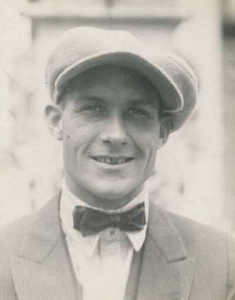By the time Goldie Rapp got to the Phillies, he had spent seven years in the minor leagues, served 18 months in the Army during World War 1, led the American Association in hitting with a .335 average, and been traded by the New York Giants to the Phillies along with Lee King and Lance Richbourg for Johnny Rawlings and Casey Stengel. Goldie got his colorful nickname because of a gold front tooth he sported, the result of a tooth lost to a childhood slip on the ice.
Legendary Giants manager John McGraw had purchased Rapp from the St. Paul Saints after Rapp's league leading year in 1920. Coming out of spring training, McGraw made Rapp the starting third baseman for the pennant contending Giants. Rapp hit only .215 in 58 games, however, and the impatient McGraw moved him to the Phillies on July 1. The Phillies were in need of defensive help on the infield. The incumbent, Russ Wrightstone, was a good hitter but a defensive liability. Phillies manager "Wild Bill" Donovan hoped Rapp would be a defensive upgrade. When Rapp arrived, Wrightstone moved to left field.
Rapp played his first game for the Phillies on July 7. Batting leadoff, he singled in his first Phillies at bat off the St. Louis Cardinals future Hall of Famer Jesse Haines. He walked and scored a run in the third on a Wrightstone two RBI single. The Phillies lost the game 15-2, allowing 14 runs in the last four innings. The next day the Phillies turned the tables on the Cards, winning 9-4. Rapp had three hits, including an RBI double, and scored two runs.
The hits kept coming for Goldie Rapp and they often came in bunches. During the streak, he had 11 multi-hit games. In one four game stretch from July 21-24, he rapped out nine hits in 17 at bats. His batting average during the streak was .381. Among his 37 hits were six doubles and one home run. The home run led off the game against the Chicago Cubs at Cubs Park (now Wrigley Field) on July 26, in a game the Phillies won, 6-2. The homer was one of only two that Rapp hit in his major league career.
Former Phillies great Grover Cleveland Alexander, now with the Cubs, shut the Phillies out, 10-0, on six hits in the first game of a doubleheader on July 20. Rapp, however, kept his streak alive with a sixth inning single off Old Pete. On July 30, Rapp finished off his streak in style with five hits, including a double and triple, in a doubleheader against the Cubs in Chicago. The streak ended the next day as Rapp went 0-for-4 with a walk against Elmer Ponder and the Cubs.
One week after the streak ended, Rapp was in the hospital with an inflamed appendix. He elected not to have surgery and returned to the team on August 14. But whatever magic Rapp had captured in his first month with the Phillies was gone. Whether it was the appendix or some other cause, Rapp hit just .183 the rest of the season. He had only two multi-hit games from August 1 to October 1.
Rapp was the regular third baseman for the Phillies in 1922, a year they went 37-96-1 and finished in seventh place. He was on the shelf for several weeks in May after he broke two ribs and sprained an ankle and wrist diving into the dugout after a foul ball. Rapp was hitting just .218 by the end of August but finished with a flourish to get his average up to .253 by the end of the season.
In 1923, new Phillies manager, and former shortstop Art Fletcher named Rapp the team captain. Fletcher was no doubt impressed by the hustling, chatterbox style that Rapp displayed. By July, however, with the Phillies record at 12-30, Fletcher decided to shake up the team. Among several changes, Goldie Rapp was released. His contract was sold to the Fort Worth club in the Texas League. Rapp played in the minor leagues for six more years, but never made it back to the majors. In his late 40s, he served in the Naval Reserves during World War 2 as a Chief Ship Fitter.
Goldie Rapp still holds a share of the National League rookie record for hitting streaks in the modern era. Both Ashburn and Alvin Dark of the Boston Braves had twenty-three game streaks in 1948. Mike Vail of the 1975 New York Mets also matched the record. The American League rookie hitting streak record is 26, set by the Chicago White Sox outfielder Guy Curtright in 1943. The all-time record is 27, set by Jimmy Williams of the Pittsburgh Pirates in 1899. Amazingly, Williams also had a 26-game streak that same year.
 |
| Goldie Rapp and his gold tooth |

Interesting story and the picture was great.
ReplyDeleteThank you. Lucky to find that photo.
ReplyDeleteThouroughly enjoyed the article Russ!
ReplyDelete